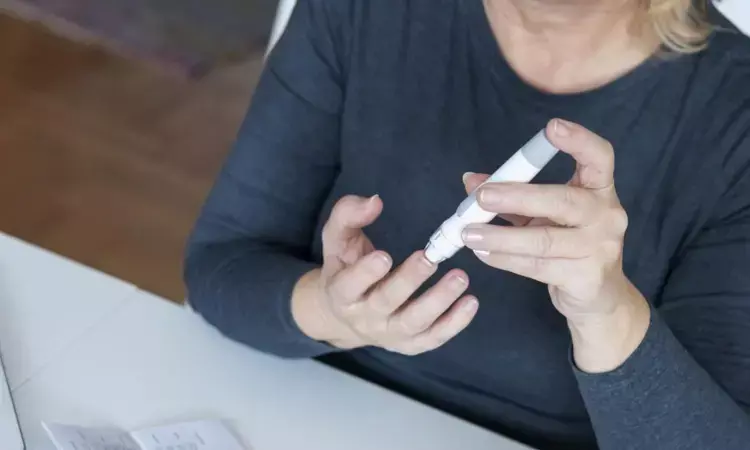- Home
- Medical news & Guidelines
- Anesthesiology
- Cardiology and CTVS
- Critical Care
- Dentistry
- Dermatology
- Diabetes and Endocrinology
- ENT
- Gastroenterology
- Medicine
- Nephrology
- Neurology
- Obstretics-Gynaecology
- Oncology
- Ophthalmology
- Orthopaedics
- Pediatrics-Neonatology
- Psychiatry
- Pulmonology
- Radiology
- Surgery
- Urology
- Laboratory Medicine
- Diet
- Nursing
- Paramedical
- Physiotherapy
- Health news
- Fact Check
- Bone Health Fact Check
- Brain Health Fact Check
- Cancer Related Fact Check
- Child Care Fact Check
- Dental and oral health fact check
- Diabetes and metabolic health fact check
- Diet and Nutrition Fact Check
- Eye and ENT Care Fact Check
- Fitness fact check
- Gut health fact check
- Heart health fact check
- Kidney health fact check
- Medical education fact check
- Men's health fact check
- Respiratory fact check
- Skin and hair care fact check
- Vaccine and Immunization fact check
- Women's health fact check
- AYUSH
- State News
- Andaman and Nicobar Islands
- Andhra Pradesh
- Arunachal Pradesh
- Assam
- Bihar
- Chandigarh
- Chattisgarh
- Dadra and Nagar Haveli
- Daman and Diu
- Delhi
- Goa
- Gujarat
- Haryana
- Himachal Pradesh
- Jammu & Kashmir
- Jharkhand
- Karnataka
- Kerala
- Ladakh
- Lakshadweep
- Madhya Pradesh
- Maharashtra
- Manipur
- Meghalaya
- Mizoram
- Nagaland
- Odisha
- Puducherry
- Punjab
- Rajasthan
- Sikkim
- Tamil Nadu
- Telangana
- Tripura
- Uttar Pradesh
- Uttrakhand
- West Bengal
- Medical Education
- Industry
Couple based therapy found beneficial for older adults with poorly controlled glycemia: JAMA

Researchers have found couple-based interventions useful for patients with uncontrolled type 2 diabetes (T2DM). Diabetes care tends to require wide-ranging lifestyle alterations, and, theoretically, involvement of the spouse is recommended. A recent study was conducted by Conghui Y. and colleagues which was published in the journal of JAMA Network Open.
The trial took place between September 2020 and June 2022, in 14 community health care centers across Guangzhou, China. There were 207 couples: 106 allocated to the intervention arm and 101 to the control arm. The study inclusion criteria required the patient to be 55 years of age or older and confirmed with type 2 diabetes mellitus; however, he/she should have a marital or cohabiting status with the spouse. Patients who had previously received education for diabetes or whose spouses had diabetes were excluded. Follow-up evaluation was conducted at 6 and 12 months after the intervention.
The couple-based intervention included four group education sessions at weekly intervals among both patients and spouses. Further, it featured behavior change booster telephone calls, which occurred across two months of time. Among the control subjects, the patient-only intervention also received the exact same intervention.
Both interventions focused on collective efficacy aimed at improving behaviors that enhanced their diabetes management.
Key Findings
Patient Results:
• HbA1c levels declined in both intervention and control arms during 12 months, with no significant difference between groups (β = −0.08; 95% CI, −0.57 to 0.42).
• Patients with baseline HbA1c ≥8.0% experienced lasting and statistically significant improvements in glucose control.
Spousal Outcomes:
• No significant differences were found between the two groups for quality of life, collective efficacy, or collective behavior among spouses.
Collective Efficacy and Behavior:
• Both groups also improved in both collective efficacy and patient-related behaviours; however, the magnitude of change was almost equivalent between treatment and control groups.
The overall effect of couple-based diabetes interventions was small, but the approach showed strong benefits for patients with poorly controlled glucose levels. Tailoring diabetes management to include collaborative strategies for couples, especially in cases of poor baseline control, holds promise for improving outcomes in older adults with type 2 diabetes.
Reference:
Yang C, Zhi J, Xu Y, et al. A Couple-Based Intervention for Chinese Older Adults With Type 2 Diabetes: A Randomized Clinical Trial. JAMA Netw Open. 2025;8(1):e2452168. doi:10.1001/jamanetworkopen.2024.52168
Dr Riya Dave has completed dentistry from Gujarat University in 2022. She is a dentist and accomplished medical and scientific writer known for her commitment to bridging the gap between clinical expertise and accessible healthcare information. She has been actively involved in writing blogs related to health and wellness.
Dr Kamal Kant Kohli-MBBS, DTCD- a chest specialist with more than 30 years of practice and a flair for writing clinical articles, Dr Kamal Kant Kohli joined Medical Dialogues as a Chief Editor of Medical News. Besides writing articles, as an editor, he proofreads and verifies all the medical content published on Medical Dialogues including those coming from journals, studies,medical conferences,guidelines etc. Email: drkohli@medicaldialogues.in. Contact no. 011-43720751


